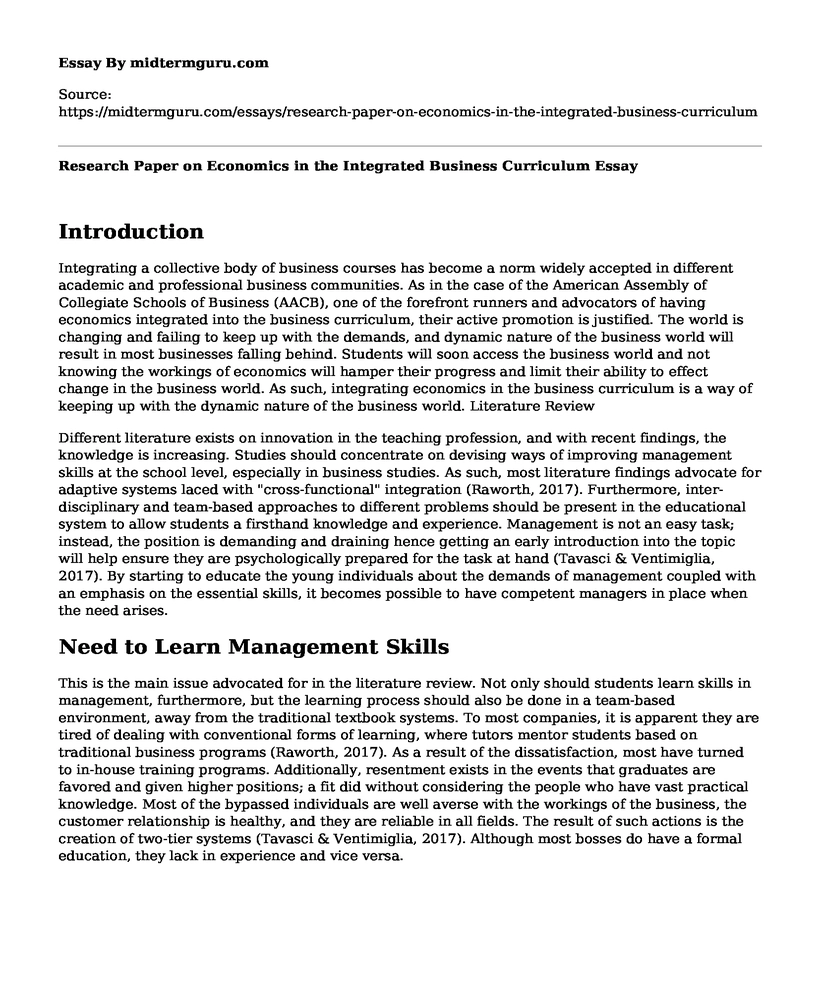Introduction
Integrating a collective body of business courses has become a norm widely accepted in different academic and professional business communities. As in the case of the American Assembly of Collegiate Schools of Business (AACB), one of the forefront runners and advocators of having economics integrated into the business curriculum, their active promotion is justified. The world is changing and failing to keep up with the demands, and dynamic nature of the business world will result in most businesses falling behind. Students will soon access the business world and not knowing the workings of economics will hamper their progress and limit their ability to effect change in the business world. As such, integrating economics in the business curriculum is a way of keeping up with the dynamic nature of the business world. Literature Review
Different literature exists on innovation in the teaching profession, and with recent findings, the knowledge is increasing. Studies should concentrate on devising ways of improving management skills at the school level, especially in business studies. As such, most literature findings advocate for adaptive systems laced with "cross-functional" integration (Raworth, 2017). Furthermore, inter-disciplinary and team-based approaches to different problems should be present in the educational system to allow students a firsthand knowledge and experience. Management is not an easy task; instead, the position is demanding and draining hence getting an early introduction into the topic will help ensure they are psychologically prepared for the task at hand (Tavasci & Ventimiglia, 2017). By starting to educate the young individuals about the demands of management coupled with an emphasis on the essential skills, it becomes possible to have competent managers in place when the need arises.
Need to Learn Management Skills
This is the main issue advocated for in the literature review. Not only should students learn skills in management, furthermore, but the learning process should also be done in a team-based environment, away from the traditional textbook systems. To most companies, it is apparent they are tired of dealing with conventional forms of learning, where tutors mentor students based on traditional business programs (Raworth, 2017). As a result of the dissatisfaction, most have turned to in-house training programs. Additionally, resentment exists in the events that graduates are favored and given higher positions; a fit did without considering the people who have vast practical knowledge. Most of the bypassed individuals are well averse with the workings of the business, the customer relationship is healthy, and they are reliable in all fields. The result of such actions is the creation of two-tier systems (Tavasci & Ventimiglia, 2017). Although most bosses do have a formal education, they lack in experience and vice versa.
Advantages of Economics in the Curriculum
Knowledge and Understanding
Having economics in the curriculum offers an opportunity for learning and understanding where the student gets a chance to reflect and think through different requirements. Through the integrated curriculum, the teacher explains cases of organizations and the existing theories in management. Furthermore, internal and external accounting theories help the student understand the requirements in ensuring they pay their taxes as well as read through the financial records to identify any cases where the balance sheet does not balance (Raworth, 2017). Through learning the supply and demand processes, knowledge on how to deal with the legal systems as well how to get in good terms with the suppliers (Tavasci & Ventimiglia, 2017). Through economics integration, strategic planning of how information systems in the organization work become practical which, a fit that helps in keeping the organization informed about different changes, visions or organizational goals.
Skills
Through integrating economics in business, the students access different skills concerning different applications. Through understanding organizational theories and models, it becomes possible for them to reflect on and evaluate the practices in the organizations. Furthermore, the students acquire accounting skills that help in the selection of relevant solutions to different business contexts. Additionally, business is rooted in strategy, a fit that becomes apparent as the student's progress in their studies. Lastly, the practice of communication and discussion on issues affecting business opens students to methods of group problem resolving (Tavasci & Ventimiglia, 2017). By understanding how to handle or talk to people, it becomes possible for them to recognize the problems before escalation and put in place measures to prevent organizational issues from spiraling out of control.
Conclusion
As discussed above, different literature exists supporting incidences of integrating economics into the business curriculum. With the dynamic nature of the business world, traditional teachings could become irrelevant if left unchecked. However, by incorporating economics into the curriculum, the management theme comes into question. Through understanding and studying the requirements of a manager, students get a grip on the skills needed to ensure competence in their management positions. Additionally, through leadership and teamwork discussions, students understand the role they have to the organization as well as to other employees. Traditional lessons were great when they lasted; however, the complexity in customer demands and competition developments require people who can adapt to the changes, hence, the call to integrate economics into the business curriculum.
References
Raworth, K. (2017). Doughnut economics: seven ways to think like a 21st-century economist. Chelsea Green Publishing.
Tavasci, D., & Ventimiglia, L. (Eds.). (2017). Teaching the history of economic thought: Integrating historical perspectives into modern economics. Edward Elgar Publishing.
Cite this page
Research Paper on Economics in the Integrated Business Curriculum. (2022, Sep 14). Retrieved from https://midtermguru.com/essays/research-paper-on-economics-in-the-integrated-business-curriculum
If you are the original author of this essay and no longer wish to have it published on the midtermguru.com website, please click below to request its removal:
- Sirius XM Satellite Radio Inc Analysis Sample
- Essays on Microeconomic
- Paper Example on Organization Culture of Two Birds Apparel Company
- Admission Essay: Hospitality Services Management
- Research Paper on NARS
- Research Paper on ASIS International
- 2JS, TP, Crisis & Creativity: Examining the Relation - Research Paper







